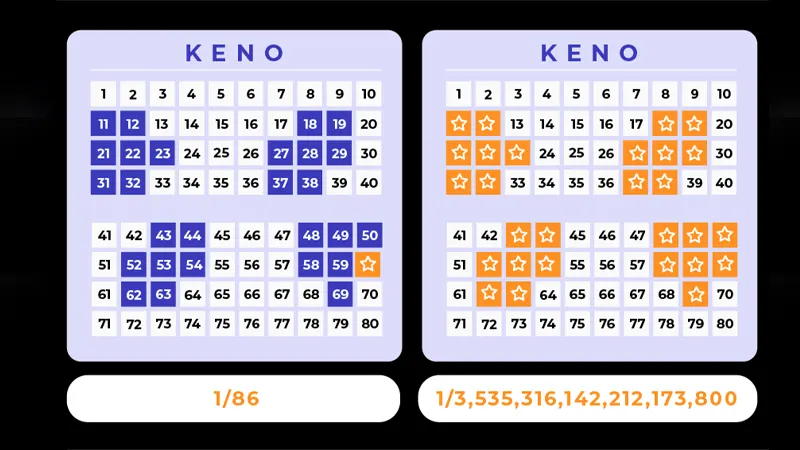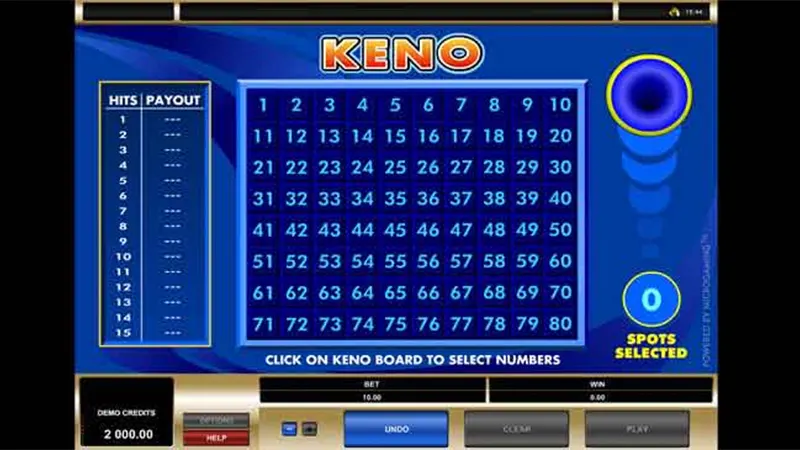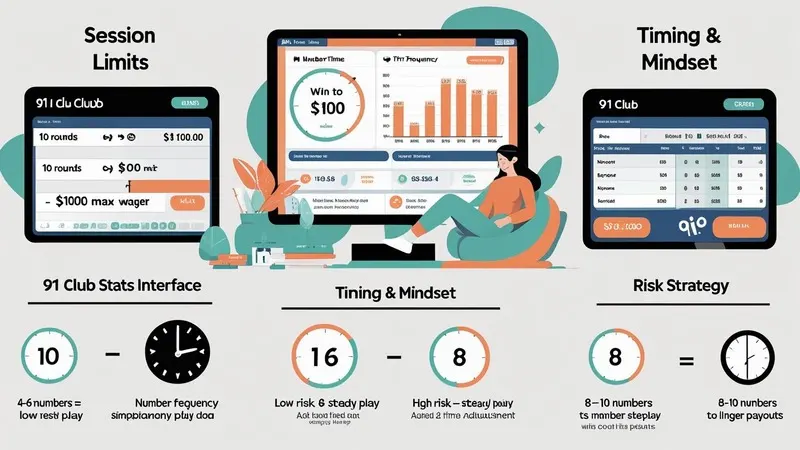Keno represents one of the most accessible and fast-paced gambling games available on modern online platforms like 91 Club. This lottery-style game combines the excitement of instant results with the simplicity of number selection, making it particularly appealing to both newcomers and experienced players seeking quick entertainment. The game’s straightforward mechanics allow players to jump in immediately without extensive learning curves or complex strategies.
However, this apparent simplicity often becomes Keno’s greatest trap. Because the rules are so easy to understand, many players dive headfirst into betting based purely on intuition, personal superstitions, or emotional impulses. This impulsive approach frequently leads to rapid losses, poor bankroll management, and falling victim to common psychological and strategic pitfalls that plague unprepared players.
This comprehensive guide aims to transform your approach to Keno by teaching you intelligent number selection methods and helping you recognize and avoid the most common traps that ensnare players on online platforms like 91 Club. By the end of this article, you’ll possess the knowledge needed to play Keno with greater awareness, better control, and more realistic expectations about this game of chance.
Understanding Keno: Basic Gameplay Mechanics
Keno operates on a elegantly simple premise that makes it instantly accessible to players of all experience levels. Participants select anywhere from one to ten numbers from a range spanning 1 to 80, then wait as the system randomly draws twenty winning numbers. The more of your chosen numbers that match the drawn results, the larger your potential payout becomes. This straightforward structure explains why Keno has maintained its popularity across centuries and continues to thrive in digital formats.
The game offers various betting approaches to accommodate different risk tolerances and playing styles. Conservative players often prefer selecting one to four numbers, accepting lower probability of success in exchange for potentially substantial payouts when their limited selections prove correct. More aggressive players typically choose five to ten numbers, increasing their chances of achieving some level of matching while accepting that their winnings will be distributed across more frequent but smaller victories.

The primary advantage of Keno lies in its speed and accessibility. Rounds complete quickly, allowing for rapid-fire entertainment and the possibility of frequent small wins that maintain player engagement. The uncomplicated rules mean anyone can participate immediately without studying complex strategies or memorizing intricate betting systems. However, these same advantages create significant risks. The fast pace can lead to “addiction” to continuous play, while the lack of skill-based elements means players have no clear strategic framework for making decisions, often resulting in purely emotional or superstitious betting patterns that rarely produce positive long-term results.
Intelligent Number Selection Strategies for Online Keno
Successful Keno play begins with understanding a fundamental truth that contradicts many players’ instincts: no individual number possesses any inherent advantage over others. Despite widespread beliefs in “lucky numbers,” birthday dates, or mystical significance attached to certain digits, every number from 1 to 80 maintains exactly the same probability of being selected in any given draw. This mathematical reality should form the foundation of any rational number selection approach.
Balanced Distribution Approach
Rather than clustering your selections within narrow ranges, consider spreading your chosen numbers across the entire 1-80 spectrum. For example, if selecting six numbers, you might choose one each from the ranges 1-15, 16-30, 31-45, 46-60, 61-75, and 76-80. This distribution strategy doesn’t improve your mathematical odds, but it avoids the common trap of concentrating all selections in emotionally significant but arbitrarily limited ranges.
Avoiding Pattern Recognition Bias
Human psychology naturally seeks patterns, even in genuinely random events. Resist the temptation to select numbers in obvious sequences like 1-2-3-4-5 or to choose only even or odd numbers. While these patterns have no mathematical disadvantage, they represent the kind of thinking that can lead to other, more harmful superstitious beliefs about number selection. Additionally, if such obvious patterns do win, you’re more likely to share the prize with other players who made similar choices.

Optimal Selection Range Strategy
Based on probability mathematics and payout structures, selecting six to eight numbers often provides the best balance between winning frequency and payout size. This range offers reasonable chances of achieving partial matches while maintaining the possibility of substantial returns. Keep detailed records of the number combinations you’ve used to avoid unconsciously repeating the same selections, which provides no strategic advantage while limiting your psychological sense of variety and engagement.
Leveraging 91 Club’s Statistical Tools
91 Club provides historical result statistics that can inform your number selection process, though these should be used with careful understanding of their limitations. While reviewing recent draws can help you avoid numbers that have appeared frequently (not because they’re less likely to repeat, but to ensure you’re not unconsciously influenced by availability bias), remember that each draw remains completely independent of previous results. Use these statistics as general guidance for maintaining selection variety, not as predictive tools for future outcomes.
Common Psychological Traps That Ensnare Keno Players
Understanding and avoiding the mental pitfalls that destroy most Keno players’ bankrolls is crucial for long-term success. These psychological traps operate subtly but powerfully, often leading rational people to make increasingly irrational decisions.
The “Due Number” Fallacy
One of the most persistent and destructive beliefs among Keno players is the notion that numbers that haven’t appeared recently are “due” to be drawn. Players convince themselves that because number 77 hasn’t been selected in the last ten draws, it must be more likely to appear in upcoming rounds. This represents a fundamental misunderstanding of probability theory. Each Keno draw is completely independent, with every number maintaining identical odds regardless of previous results. A number that hasn’t appeared in 100 consecutive draws has exactly the same probability of being selected as one that appeared in the most recent draw.
Emotional Escalation After Losses
Consecutive losses create powerful emotional responses that cloud rational judgment. Players experiencing losing streaks frequently react by doubling their bets, selecting more numbers per round, or abandoning their original selection strategy entirely. This emotional escalation typically accelerates losses rather than recovering them, as decisions made under emotional stress rarely align with sound mathematical principles. The intensity of wanting to recover losses quickly overwhelms the patience required for disciplined play.

Superstitious Selection Methods
Many players develop elaborate systems for choosing numbers based on dreams, significant dates, license plate numbers, or other personally meaningful but mathematically irrelevant factors. While these methods might provide psychological comfort or entertainment value, they offer no statistical advantage and can create dangerous overconfidence. Players who experience early success with superstitious methods often attribute their wins to the system rather than random chance, leading to increased betting and eventual disappointment when natural variance produces losing periods.
Absence of Betting Limits
The rapid pace of online Keno makes it particularly dangerous for players who don’t establish clear boundaries before beginning play. The quick succession of draws can create a hypnotic effect where players lose track of their total wagering and continue betting far beyond their intended limits. Many players discover they’ve depleted their entire bankroll within minutes of starting play, having been caught up in the excitement of continuous action without maintaining awareness of their cumulative spending.
Responsible Keno Play at 91 Club
Developing a structured approach to Keno play protects you from the game’s inherent risks while maximizing your enjoyment and potential for positive outcomes.
Establishing Session Parameters
Before beginning any Keno session, determine specific limits for both the number of rounds you’ll play and the total amount you’re willing to wager. For example, commit to playing exactly ten rounds with a maximum total investment of $100, meaning $10 per round on average. Stick rigidously to these limits regardless of whether you’re winning or losing. When you reach either your round limit or spending limit, stop playing immediately and take a substantial break before considering another session.
Intelligent Use of Statistical Information
91 Club’s statistical displays can enhance your playing experience when used appropriately. Review historical results to identify broad trends and maintain variety in your number selections, but avoid falling into the trap of believing these statistics predict future outcomes. Use the data to ensure you’re not unconsciously repeating the same number combinations session after session, but don’t modify your selections based on beliefs about which numbers are “hot” or “cold.”

Optimal Timing for Play
Never play Keno when you’re experiencing emotional distress, fatigue, or pressure to recover losses from other activities. Your mental state directly affects your decision-making quality and adherence to predetermined limits. Schedule Keno sessions for times when you feel relaxed and mentally clear, treating the game as entertainment rather than a solution to financial problems or emotional difficulties.
Risk-Adjusted Playing Strategies
Adapt your number selection quantity to match your risk tolerance and session goals. If you prefer conservative play with steady, modest returns, focus on selecting four to six numbers per round. This approach provides reasonable chances of achieving partial matches without requiring perfect predictions. For players seeking larger potential payouts and willing to accept lower success rates, selecting eight to ten numbers can provide exciting possibilities, but should be done with appropriate bet sizing and clear understanding that wins will be infrequent.
Keno is Random, But Your Approach Doesn’t Have to Be
Keno remains fundamentally a game of chance where no amount of skill or strategy can guarantee consistent profits or overcome the mathematical house advantage built into the game’s structure. However, the distinction between random outcomes and random decision-making represents the difference between recreational entertainment and financial disaster. While you cannot control which numbers the system selects, you maintain complete control over how you approach the game, manage your bankroll, and respond to both winning and losing outcomes. Playing with clear strategy and emotional control creates significant advantages over the majority of players who approach Keno impulsively and without systematic thinking. Even though you cannot predict winning numbers, you can play more intelligently than most other participants by avoiding common psychological traps, maintaining disciplined selection methods, and adhering to predetermined limits regardless of short-term results. Whether you experience the thrill of a substantial win or the disappointment of a losing session, your long-term success depends more on your preparation, discipline, and emotional management than on the random number generation that determines individual round outcomes. This mindset applies across other chance-based games as well—whether it’s Keno or Fantan online, staying grounded in strategy and self-control makes all the difference. Experience Keno at 91 Club with clear thinking, reasonable limits, and genuine enjoyment as your primary goals, ensuring that chance enhances your entertainment rather than controlling your financial decisions or emotional well-being.

